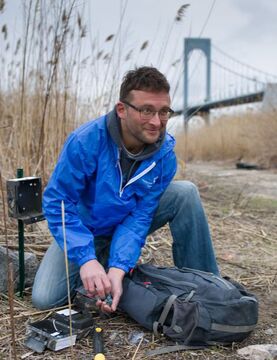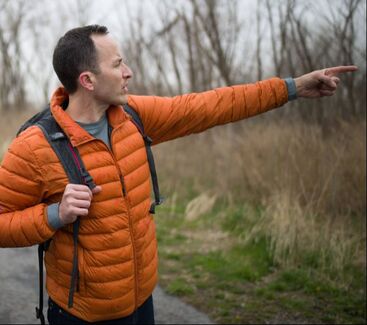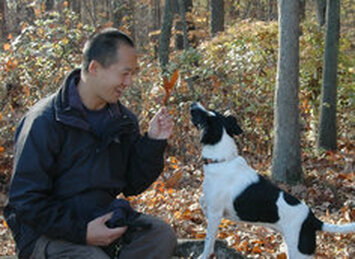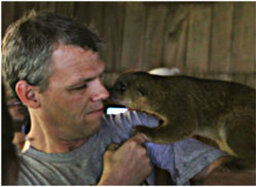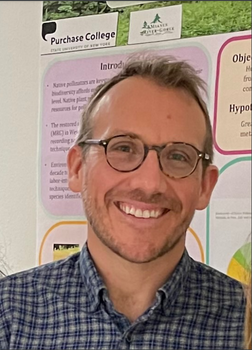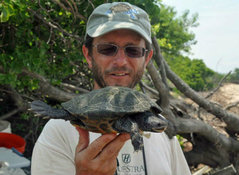Gotham Coyote is a collaboration of researchers and educators from several institutions around the region working together to better understand coyotes and their role in our urban ecosystem. We are very proud that our team has included dozens of high school, undergrad, and graduate students over the years.
Current Researchers
|
Chris Nagy is the co-founder of Gotham Coyote and has worked in NYC as a wildlife biologist since 2001. His graduate work at Fordham University and CUNY focused on the population biology of eastern screech owls in NYC, and he has always been interested in learning how wildlife can make a living in an urban environment. He is currently Director of Research and Education at the Mianus River Gorge in Westchester, NY. Chris contributes his expertise in population and occupancy modeling as well as a thorough knowledge of NYC parks, and coordinates all GCP research.
CN on ResearchGate |
|
Mark Weckel is a Brooklyn born, Bronx and Manhattan educated, Queens resident, conservation scientist and co-founder of Gotham Coyote . He attended Fordham University and CUNY where he worked on jaguar conservation and white-tailed deer management, respectively. Mark spent ten years managing forests and wildlife in Westchester County where he developed a research-based mentoring program for high school students. Mark is currently the Director of Youth Initiatives at the American Museum of Natural History and a visiting scientist at the AMNH's Center for Biodiversity and Conservation.
|
|
Ferdie Yau is a wildlife biologist with a MA in Conservation Biology from Columbia University and a Certified Professional Dog Trainer (CPDT-KA). Ferdie has studied jaguar in Belize, worked as an Ecological Project Manager for the City of New York, and trained a diversity of wildlife including polar bears, penguins, and river otters at the Wildlife Conservation Society’s Central Park Zoo. He connected with the Gotham Coyote Project to train dogs to detect coyote scat.
|
|
Neil Duncan is the Collections Manager for the Department of Mammalogy at the American Museum of Natural History. He is responsible for the day to day operations of the department as well as implementing collections improvement projects. Before coming to the museum he worked in various parts of the country employed in different wildlife and fisheries jobs. One of his favorites was working as a biologist for the US Fish and Wildlife Service studying forest carnivores in Northern California. Since that time Neil has analyzed over 3000 scats and has been involved in diet studies of fishers, martens, fox and coyotes from localities around North America. Neil is currently leading our coyote diet research.
|
|
Stephen Harris is an Assistant Professor of Biology at SUNY Purchase. He teaches genomics, biotechnology, and molecular biology. Purchase college is a undergraduate liberal arts school where everyone Biology major does a year long research project. This rotation of students work in his lab to study how organisms and populations are affected by anthropogenic environmental change, combining field work, genomics, and computational biology. He uses portable and high-throughput Oxford Nanopore sequencing for most genomics projects to provide hands on skills to students and researchers. His work has looked at honeybees, eDNA of pollinators, avian viromics, and now coyotes. He is also co-founder of Science-Corps, https://science-corps.org/, a non-profit organization that sends post-PhDs to teach science abroad for six months.
|
|
Russell Burke is a Professor of Biology and Donald E. Axinn Distinguished Professor in Ecology and Conservation at Hofstra University. He teaches graduate and undergraduate disease ecology, invasion ecology, biostatistics, and introductory ecology and evolution. His lab studies local community ecology through investigations of the diets, predators, and population dynamics of feral cats, raccoons, opossums, box turtles, wood turtles, and diamondback terrapins. Current goals include improving the use of wildlife monitoring techniques that can work well in urban and suburban habitats, and including red fox and urban coyotes into studies of Long Island wildlife dynamics. See http://russelllburke.wix.com/labs.
|
Collaborators & Past Researchers
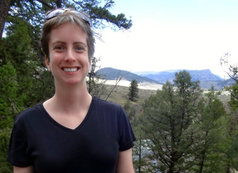
Carol Henger joined GCP after working as a primate keeper at the Wildlife Conservation Society's Bronx Zoo. She received her doctorate at Fordham University where her dissertation focused on using genetic analysis of coyotes and their diet in New York City. The results of her work answered many questions about the NYC coyote population, including how coyotes are related within and across City greenspaces, their diet, and how the whole NYC population is related to upstate and NJ coyotes.
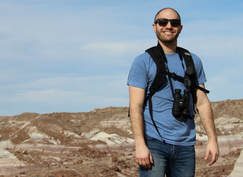
Anthony Caragiulo is the Assistant Director of the Sackler Institute for Comparative Genomics at the American Museum of Natural History. His graduate work at Fordham University focused on the population and conservation genetics of pumas across. Anthony continues to lead projects examining the population genetics of large carnivores using non-invasive genetic techniques. Anthony has also been a mentor in the Science Research Mentoring Program at AMNH for the past six years, and his students are currently working on using environmental DNA to survey mammal communities in NYC Parks. He is also currently collaborating with researchers from Princeton's Canine Ancestry lab to investigate the hybrid ancestry of northeastern coyotes in NYC and Long Island
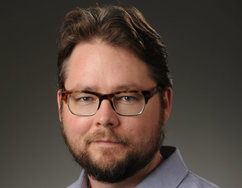
Jason Munshi-South is an Associate Professor at Fordham University. He maintains a lab at the Louis Calder Center, Fordham's biological field station in Armonk, NY, and teaches graduate and undergraduate courses at Fordham's Rose Hill campus in the Bronx. His research group is dedicated to studying the ecology and evolution of urban wildlife. A particular focus of the lab is applying the latest population genomic techniques to understand how urban populations are adapting to cities.
Learn more at http://nycevolution.org/
Learn more at http://nycevolution.org/
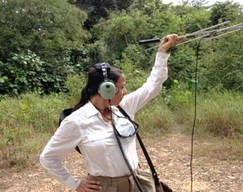
Christina Colόn is an Associate Professor at Kingsborough Community College where she also serves as the CSTEP Coordinator. Prior to joining the faculty at Kinsgsborough, Dr. Colon was an instructor at Columbia’s Center for Environmental Research and Conservation, an Education Curator at The New York Botanical Garden and Secondary Instructor at the Bronx Zoo. Colόn conducted her Masters' thesis on jaguars in Belize, and her doctoral dissertation on the Malay civet in Borneo. After years of active research in Asia studying palm civets, binturongs and sun bears, she has shifted to local species in an effort to involve her students in her research. She currently works with dozens of students to study the breeding ecology of American horseshoe crabs in Jamaica Bay, and has begun to examine Gotham’s resident coyotes during the fall. Dr. Colόn currently lives in Manhattan where she was born.
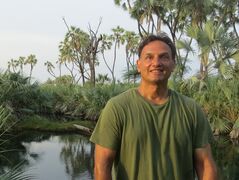
Bobby Habig is an NSF Postdoctoral Fellow at Queens College and the American Museum of Natural History. His integrative research program encompasses evolutionary biology, urban ecology, and science education. To better elucidate patterns of biodiversity in the urban landscape of New York City, Bobby established the Bronx River Research Project at Queens College. The goal of this project is to investigate the underlying ecological and evolutionary processes that shape patterns of community composition in an urban context. He is presently mentoring four urban ecology graduate students. Bobby is broadly interested in antagonistic coevolution in an urban context – how competition, predation, parasitism, and mutualisms drive the reciprocal evolution of species
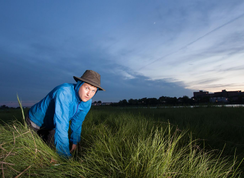
Ivan Kuraev is a photographer living in NYC. Ivan is using specialized camera traps to photograph the City’s elusive coyotes and showcase their urban habitat. These cameras have produced an abundance of beautiful selfies taken by New York’s persistent attention hogs - raccoons. However, editing through all those raccoon photos has been worth it, because the cameras are also providing us with unique images of New York’s resident coyotes. Ivan is a contributing member of the Urban Coyote Initiative, a collective of photographers and filmmakers documenting the stories and science of North America’s urban coyotes. See more of Ivan’s work at www.ivankuraev.com and learn more about the Urban Coyote Initiative at www.urbancoyoteinitiative.com
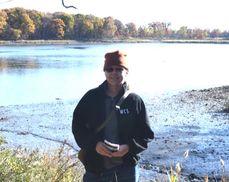
Kristin Schaumberg is a lifelong resident of City Island in the Bronx. She graduated from Fordham University in 2007 with a Master of Science degree in Ecology. Her MS thesis was on avian community composition and nesting success among tidal marsh habitats in Connecticut. Kristin was a Wild Animal Keeper at the Bronx Zoo and currently works with Gotham Coyote monitoring coyote populations in Pelham Bay Park using camera traps.
Kristin also volunteers in the Ornithology Dept at the American Museum of Natural History.
Kristin also volunteers in the Ornithology Dept at the American Museum of Natural History.
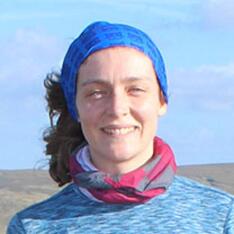
Anne Toomey is a conservation social scientist who is interested in how people connect to their natural environment and the role of science in supporting that connection. She completed her PhD in Human Geography at Lancaster University, which sought to understand local perceptions of scientific research in the Bolivian Amazon. Previous to her doctorate she worked in community development and environmental sustainability in Nicaragua, Mexico and New York City. In 2009, together with Mark Weckel and Chris Nagy, she co-created the first study of coyotes in the metropolitan area, which would later become the Gotham Coyote Project. Anne is currently a professor of Environmental Studies at Pace University.
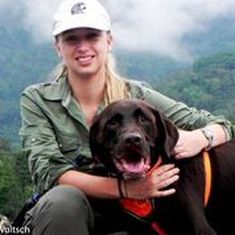
Claudia Wultsch is a research fellow with the Bioinformatics Core Infrastructure Laboratory (CUNY Hunter College/Weill Cornell Medicine) and Panthera and an associated researcher with the Sackler Institute for Comparative Genomics at the American Museum of Natural History. I have a broad interest in ecology and conservation of carnivores occurring across fragmented and human-dominated landscapes. During the last 15 years, I have implemented and continue to drive forward a range of different research projects in the Americas, Europe, and Asia addressing ecology, conservation and health related questions focusing primarily on mammalian carnivores (e.g., jaguars, snow leopards, coyotes). I apply cutting-edge technologies and innovative research approaches in the field and laboratory to gather valuable information on wildlife species of conservation concern to ultimately improve conservation and management planning.

